| Jess | Tea, Lush & Music | Main : @subtlemalice Langblr : @raavenstaglanguage
Don't wanna be here? Send us removal request.
Photo
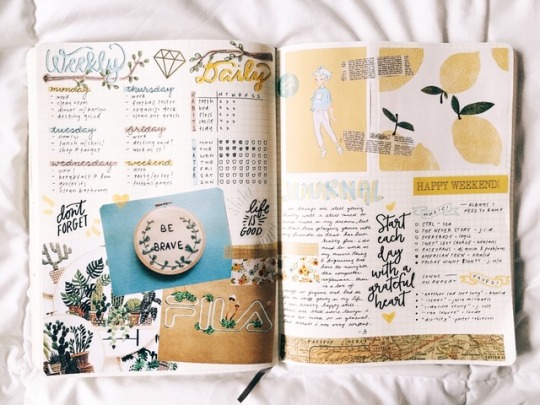
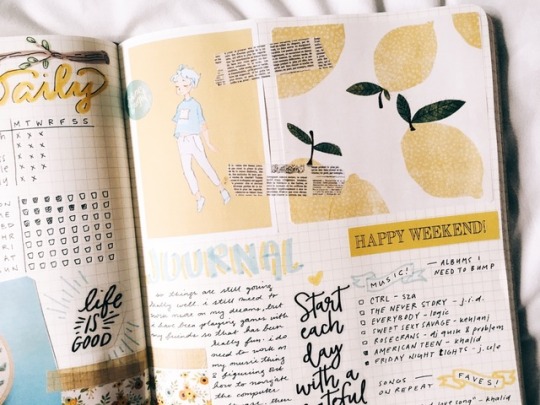
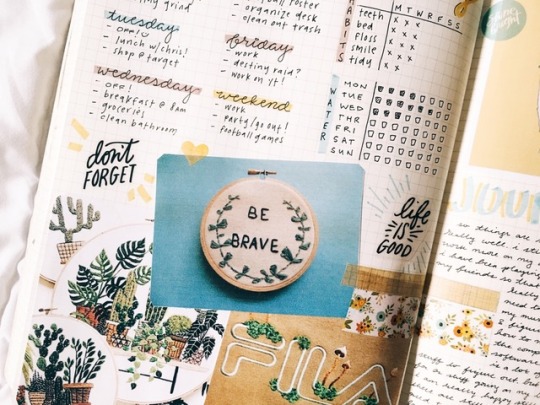
9.25.17+9:07am // journal spread from last week! also, it’s autumn and i’m so excited bc this is my favorite time of the year. push through exam week, everyone - you can do it! credit to @whistlecat/post & sarah k. benning/post.
11K notes
·
View notes
Photo

still dreaming about this peachy spread 🍑
351 notes
·
View notes
Photo

My massive master post of master posts. Note: I tried posting this earlier but it got messed up and im posting it again. EDIT: THE LINKS NO LONGER WORK, SORRY studying/general: ultimate studying by @iridescentstudy study basics by @superstudy ultimate back to school mp by @studyspoinspo school cheat sheet by @jwstudying lazy guide to good grades by @artkidstudies guide to studying by @elkstudies study tips for lazy students pt.1 by @collegetothestars study tips for lazy student pt.2 organisation mp by elkstudies back to school mp by schloarlystudies school supplies by @hermionegoals study methods by @etudiance how to grow up learning how to study by @study-well guides to life by secretly-einstein subject resources list by elkstudies studying tips & resources by @sharpiefumesandnotetaking 101 study tips by @study-early a stash of tiny study tips complete guide to studying well by @scholarlysquad studyblr masterpost by @getstudyblr resources for neurodivergent students by chemistry-hoe study mp by @theinspiringstudyhub study post mp by strive-for-da-best rock this semester mp by theanxiousstudent general studying m.p by @studytip study tips by hermionegoals study & life mp by @dutchstudyblr m.p (studying etc.) by @mystudyblur how to group work by studiyng bullet journals by @cutestudystuff living & studying with anxiety by @hayley-studies college mp by @notquitenightingale college m.p by college-campuses selfcare: anxiety by @solarstudy feeling ok? self help masterpost of masterpost by sherwat selfcare cheat sheet by jwstudying websites to feel good by samlest simple self care practices by alittlebitofpcos 22 less difficult self-care practices by mapsfortheroad anxiety distraction games some mental health resources self care for students by @cortexstudy browse through sydney-studies self-care tag self care mp healing/ selfcare m.p by fuckyeahmizedbeauty all the self care by @saturdaystudying self care mp to help you get through school stress relief by higschoolering self care m.p by exhale-doubt self help m.p time to sleep by ofinervas getting a goodnight’s sleep by higschoolering sleep? sleep. by studygene apps App masterpost by @studiyng chrome extensions for disabilities by cayennepeper helpful apps by @gracelearns printables: printables by studiyng printables by studywithnerdyglasses printable mp by me 2016 planner printables m.p by @marias-studyblr printables m.p by @studytops printables m.p by chemistrynerd2020 printables by @highschoolering printables m.p by @studie-s
productivity/motivation concentration by @study-star how to study when you don’t want to by @minimaliststudies productivity mp getting started with studying by @stvdyghost organization & goal setting m.p by @studyhope staying productive by elkstudies
free/moneysaving learn things for free by girl-havoced 100 legal sites to download literature from by itsrosewho sites to get free textbooks by thearialligraphyproject money mp by @academla how to studyblr on a budget by @studygene literature/writing stuff you need for essays by @studyign expand your vocab by study-star annotating effectively by @hideandstudy ultimate english mp by @areistotle food feed your brain by @studybowie stay sated while you’re motivated (food) by areistotle healthy food guide
notes color coding notes by @aca-demia upgrade you notes mp by @studylou how to mindmap by @study-nsp
exams exam m.p by theanxiousstudent cramming 4 exams by @gflynnx
history history mp by iamerudite psychology: AP psychology study stuff by thisplacethatiknow teach yourself by tobeagenius
science/math: free science books by the-more-u-know ultimate science masterpost by me AP chemistry mp by etudiance maths mp by @organisaticns algebra m.p by etudiance geometry m.p by eutdiance language: japanese by @fuckstudy arabic m.p by rockinspired french by organisaticns french resources by @theperksofbeingstudying french resources by higschoolering italian by studybowie
other masterposts of masterpost: favorite masterposts by @studybudyblr m.p of masterposts by iridescentstudy vangoghstudies m.p of masterpost m.p of masterpost by academla astrophyscs mp of masterposts
fun/misc: Bordem cheat sheet by jwstudying DIY mp by studiying trans resources m.p hobbies mp by killyouranxiety general resources m.p by needforcaffeine mp of basically everything by bakrua stationery m.p by equipoises music m.p by studyaim study sounds study playlist
9K notes
·
View notes
Text
in case u stressed abt school
how to get motivated
10 useful study websites
how to be a morning person
taking notes on an ipad
how to beat test anxiety
group studying advice
how i catch up with work
15 habits of successful students
how to de-stress from school
maybe try summary foldables
how to start a planner
advice for freshmen
how to cram for a test
avoid careless mistakes
25 awesome study tips
time management advice
how to get organized
common study mistakes
fastest way to take notes
how to start a bullet journal
stop procrastinating
15 study tips
how to make mind maps
memorization advice
reorganize ur study space
act study advice + tips
advice: hs freshmen
advice: hs sophomores
advice: hs juniors
advice: hs seniors
18K notes
·
View notes
Text

HOW TO GET DECENT AT MATHS
Practice - try past papers, do all the questions your teacher asks, do even more if you’re not quite getting the gist of it. Using past papers is a great way to practice for your exams because you can treat it like a real exam, and it’ll show you how you’re doing. It gives you an idea of what you need to improve on, whether it’s time management, certain topics, reading the question etc.
Ask for help - if you don’t know something as well as you should, your best resource is your teacher. It took me a long time to understand that the teachers are there to help and that it’s worth asking questions if and when you don’t understand something. Your teacher can go over something in as much detail as you need and you can ask them questions, better than reading a textbook or watching a video if you’re completely lost.
Keep your class notes - class notes may not look the part but they can help you remember the time you actually learnt the information. They will be full of examples and definitions and probably more right answers to problems than in your homework. If you don’t know where your notes are (I recommend a notepad instead of loose leaf paper so all of your work is together but that’s just me) then ask a friend in your class if they can send a picture of that days work.
Repeat questions - repeating questions, especially long winded ones, is one of the best way to stomp out stupid mistakes. You can repeat a question and compare your answers to see if you’re still doing things right. If you don’t get the same answer then you have two different approaches to a question and only one of them is right, so you can learn more about your thought process by looking at where you did things differently. Are you doing it how it should be done? Check without exam board what you are and aren’t allowed to do. Got the same answer but you remembered what you were trying to get to? No, it’s not cheating. You remembered the steps you needed to take to get to the solution, it’s almost like you’re actually learning something.
Annotate long answers - if you have an example from class that you know is right then along one side of your paper annotate the steps you’re taking. This will help you remember what you need to do an when, and is especially good for questions where you have to solve things differently depending on what is actually in the question. I used this when I had to remember how to do integration by substitution because I got the steps mixed up really easily.
I found these useful whenever I was stuck:
Khan Academy - YouTube channel, hundreds of videos on many different topics
Physics and Maths Tutor - Great for GCSE and A-level students. Past papers, mark schemes, questions by topic, different exam boards, model answers etc
Exam Solutions - Similar to physics and maths tutor, loads of videos that are really helpful
WolframAlpha - If you have no idea where to go with a question or want to check your answer to something, throw it into WolframAlpha and it’ll give you the solutions
MyMaths - I used it for GCSE and can’t really remember it but it did help me get uses to answering different types of questions
91 notes
·
View notes
Photo

vectors ~ maths - revision in costa lmao - study tip #4 - try and get plenty of sleep (ik ik). try sleeping an hour before usual, this means you’ll get an extra hour of alertness and you’ll be more awake. - keep studying 🤙🏽
162 notes
·
View notes
Text
gcse maths youtube channels
here are some useful youtube channels for maths, most of them go through questions and papers:
wrightmaths has specimen paper questions for the new gcse maths spec and the previous specification
achievemaths goes through past papers
onmaths
hegartymaths
ukmathsteacher
tecmath not necessarily targeted for gcse, but useful maths skills and “tricks”
rawmaths
maths520
crashMATHS
mrjefferymaths
maths gcse pastpaper solutions
themathsman
maths3000
mathsauraus
maths made easy
– hope this helps. i’m trying to find some more maths resources, especially for the new gcse, since maths is my worst subjectヽ(^Д^)ノ –
354 notes
·
View notes
Photo

“I hear and I forget. I see and I remember. I do and I understand.” – Confucius
52K notes
·
View notes
Text
So I was frantically searching for something to help me revise chemistry, physics and biology and I came across this youtube channel which goes over the basics that you need to know for each of the science topics.
The link to the channel is here: https://www.youtube.com/channel/UCBgvmal8AR4QIK2e0EfJwaA
And here are the videos that I used:
Chemistry:
C1: https://youtu.be/7Gt4LnaHf78
C2: https://youtu.be/iNXJ259fBa0
C3: https://youtu.be/zEWGDi4N3xw
Biology:
B1: https://youtu.be/KjKWmpr7H_Y
B2: https://youtu.be/6bxmIxPFO4s
B3: https://youtu.be/a_7J-mJrBj8
Physics:
P1: https://youtu.be/bR0boPq3v5Q
P2: https://youtu.be/cKDbzh9MojY
P3: https://youtu.be/UoTgo5wi6AQ
As I said before, these videos are very basic and brief, however, they’re really good to watch as a summary or for some last minute revision.
Enjoy :)
1K notes
·
View notes
Photo









Finally an update !! earlier this month i started itching for more room in my planner + so this week i started up a new planner in an A5 leuchtturm1917 (link).
Having an A5 planner used to be out of the question for me as i didn’t feel it practical to carry around, but i’m a lot less mobile in my 3rd year of uni + will be even less so next year after graduation!
I wanted to see if it was possible to combine my bullet-journal and personal journal/sketchbook as i’m always carrying them both around separately + was struggling to remember to keep on top of them both. Idk how well this idea will work out but i’m very hopeful, and excited to think that each completed book would almost be a full catalogue of my experiences at the time ?? yessssss
I bought a plastic notebook cover on amazon (link) that fits it perfectly + im excited to slot postcards in the front and back of the book !!!
The pages from top left to bottom right show:
The cover page for my personal future log
My personal future log spread
Some academic notes + the cover page for my academic future log
My academic future log
My December monthly spread
My December gratitude log + moodboard
A weekly spread (its nice to have more room)
A daily page (its also nice to have more room here, i debated about using half pages but actually really like being able to be more detailed if i want)
An example of a sketchbook/journal page in the back of the book!
So there we go !! this is the initial set-up but i’ll update with anything that changes or gets introduced. Let me know what you think ??
4K notes
·
View notes
Video
345K notes
·
View notes
Text
How to Take Notes from a Textbook
I’m currently facing the dilemma of how to take notes from a textbook. It’s hard to know where to begin or what’s the best information I need to really understand the material I’m reading. I have gathered tips and resources to better decide the best method to use the textbook most effectively.
-Preview. Glance over charts or photos used on the pages. Read study questions or summaries that might be given at the end of the chunk of pages. It preps me for the type of reading I will do and to think about the questions as I read.
-Read actively. Don’t take notes or highlight as you read. Read a short section before you stop to take notes and highlight. Your first step after you read the paragraph is to highlight a phrase or two that were the important parts that you’ll need to know for future reference. Also, go to the margins (or your post-its) and start writing a question or two for the paragraph. When you’re done with the entire section, go back and try to answer these questions without looking at the book. If you can answer it, you are doing well on recalling that paragraph. This is also a good time to make some notes for class.
-Review. At the end of the reading, write a summary (in your own words) of what you just read. It helps to understand what you retained from the reading and highlight parts you need to review. I also like to go back and try to answer those questions I made in the margin again. The BEST thing I like to do is to answer the comprehension at the end of the chapter. Each textbook has one. Answer those and, if you’re unsure of the answer, ask them during class!
Other tips:
-Try to keep your notes in your own words.
-If something is not making sense, try reading it out loud. That can often help you process the material in a new way.
-Multiply the number of pages you have to read by 5 minutes. That is the amount of time the average college student needs to spend on their reading assignment.
-Writing in the book itself is highly recommended, but if you have some reason for not doing that, you might also want post-its and use those on each page in place of writing in the book.
Resources:
Write Notes, Not Textbooks
How to Take Notes from a Textbook
Justine G. Feather- HOW I TAKE NOTES
6K notes
·
View notes
Photo

Top 4 Tips For Delivering a Perfect Class Presentation
1. Perfect timing for the presentation
You really don’t want to have to rush the end in order to finish in time or drag it out because you got nervous and started talking way too fast. To ensure your class presentation fits the pre-established time frame.
Time yourself when practicing – give yourself about three tries before cutting out or adding information to better fit the allowed time. Make sure you’re speaking at a normal pace. This is an important step when preparing for the presentation.
Have an ally – you may have timed your class presentation perfectly, but, once you’re out there, your nerves may get the best of you. So, ask a friend to gesture whether you’re speaking too fast, too slow or too quietly, and to just give you a thumbs up if you’re doing well.
2. Smooth performance
Stammering, filler words, awkward pauses, and multiple false starts. These are all things that are immediately associated with ‘You just have no idea what you’re talking about’, even if you do. So how do you avoid this?
Practice, practice, practice – the best way to avoid messing up is to know your topic like the back of your hand. The first couple of times, check yourself using a paper where you’ve written the entirety of what you want to say. Once you’ve more or less familiarized yourself with that, start practicing with the actual paper/slides that you’ll be taking to your class presentation (hint – this one should only have bullet points). Only check your paper if you don’t remember certain details about a point, not if you’ve forgotten the sentence structure or a particular word. This way you’ll ensure that, when you’re giving your class presentation, you will be able to use your own words and won’t pause if something escapes your mind.
Take a deep breath – If at the beginning or middle of your class presentation you blank out, it’s fine! Storytime – I once had to give a class presentation that was worth 30% of my grade. I thought I was fine but, once my teacher said I could start, I totally blanked out. You know what I did? I took a deep breath, quickly glanced at my first bullet point, gathered my thoughts and proceeded to give a great class presentation. You may think it’s the end of the world if you pause for a moment but – spoiler alert – it’s not. Everyone, including teachers, understands that these things happen and they’d rather you take the time to regroup than stammer nervously for the next five minutes.
Continue to read the article on Students Toolbox!
make sure to also stay tuned by following Students Toolbox’s social media: Facebook | Twitter | Instagram | Tumblr | Feedly | Pinterest | Google+ | Bloglivin’
421 notes
·
View notes
Photo




some of my biology notes so far ( ◠‿◠ )
ig: studyng
6K notes
·
View notes
Text
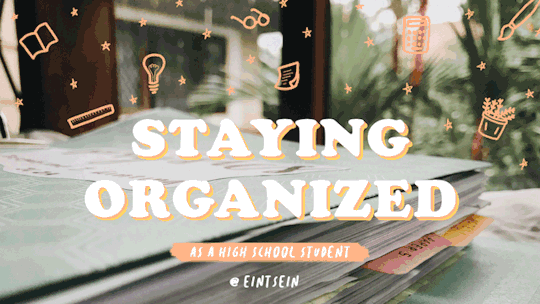
Hey guys, so I’m nearing the end of my senior year, and it’s been great so far! I accomplished my academic tasks efficiently and didn’t burn myself out, and I think the main contributor to my success as a student is my organization system. This system has been refined throughout my high school years, but I think now I’ve finally found the most effective methods.
Please remember that this isn’t the only organization system you can adopt; this is just the one that works the best for me, and I hope that by sharing it with you, you’ll gain a new perspective on how to stay organized as a high school student.

The first thing I wanna talk about is my notebook system, which I briefly mentioned in my Guide to Note-Taking.
My notebook system comprises three types of notebooks: the Everything Notebook, the subject notebook, and the revision notebook.
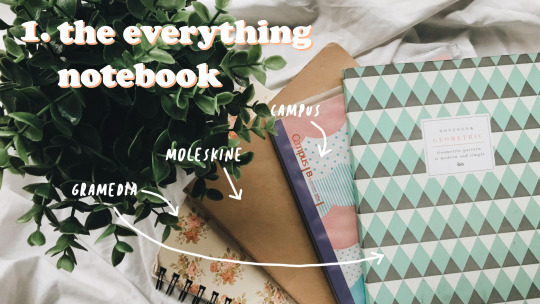
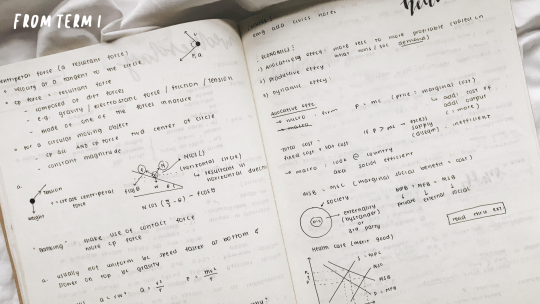
The Everything Notebook
The first stage is in-class notes. I only bring one notebook to school every day. I call it my Everything Notebook, and this is where I write down all of the notes I take in class. This way, I don’t have to lug around six notebooks where I’m only going to use a few pages in each of them that day.
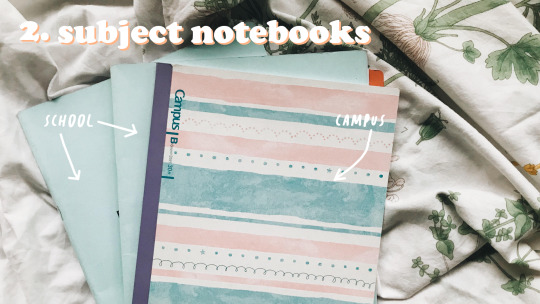
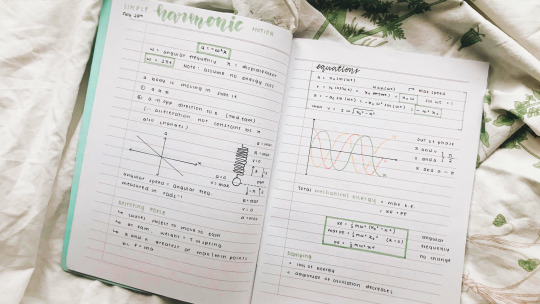
Subject Notebooks
At the end of the day, I would revise my notes and compare them to the syllabus so I know where we are in the learning process. I would then transfer my class notes from my Everything Notebook to my different subject notebooks. This is stage two. I also start to jazz up my notes because I use the notes in my subject notebooks to study for tests.
In addition to my class notes, I include material from my teachers’ notes that they might not have elaborated on, as well as points in the syllabus (I’m currently taking A2) that were only glazed over briefly, or not at all, in some cases. (Note: this does not mean they completely skip a chapter or topic; it’s more like they missed a few bullet points that should be in my notes but aren’t. An example would be if we’re learning about phenol reactions and the teacher forgot to mention the use of FeCl3 as a test for phenol.)
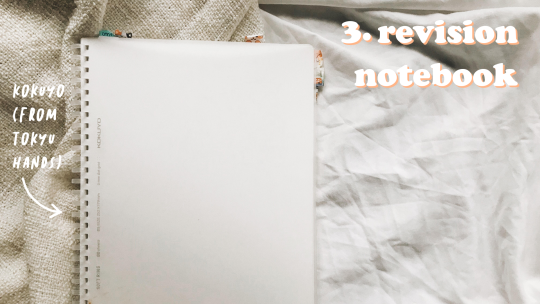
Revision Notebooks
Stage three comes a little later, when exam week is just around the corner. Essentially, I rewrite and improve my notes from my five different subject notebooks into a single revision notebook or binder. (Recently, I’ve opted for a revision notebook because they’re lighter and easier to carry around.)

Because my teachers don’t always teach in the order of the syllabus, the first thing I do is organize my notes according to the syllabus. I would then fill in any other missing gaps in the material that hadn’t been filled in stage two.
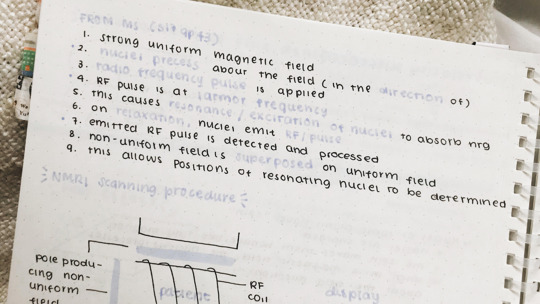
When compiling material for my revision notebook, I use as many sources as possible: my own notes, my teachers’ notes, youtube videos, online sites, and my favorite, the mark scheme! I add in some answers from past papers (explanations only, so no calculations) mainly to secure marks. It’s safer to memorize definitions straight from the mark scheme than from the textbook or from handouts. I also do this to ease my memorization, especially for topics that require lengthy explanations. It’s a lot easier to remember the 6 points I need to explain the principles of NMRI than to remember everything in the four-page handout my teacher gave me.

Folders and binders are essential to organizing your papers. Some people keep a single accordion folder for all their papers, but for me it’s just too heavy to carry around all the time. The same goes for subject folders that are brought to school every day.
Instead, my binder/folder system comprises my Everything Folder and my subject binders.
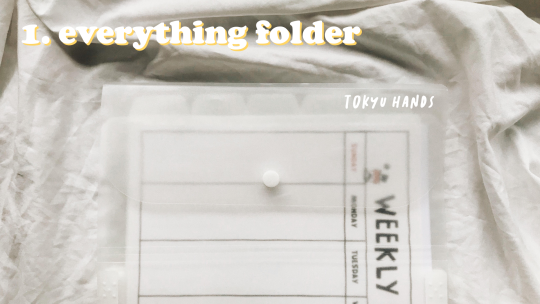
The Everything Folder
The folder I carry with me to school every day is this A4 folder I got from Tokyu Hands. It has 5 pockets, one for each day of the week, so all the papers I receive on Monday will go behind the first divider, and so on.
Some people also keep blank papers in their folders; I don’t because my school has its own lined paper and graphing pads that I keep under my desk that I use if a teacher asks us to do an assignment on those papers. If I do work at home, I prefer to just use a plain A4 paper or a legal pad.
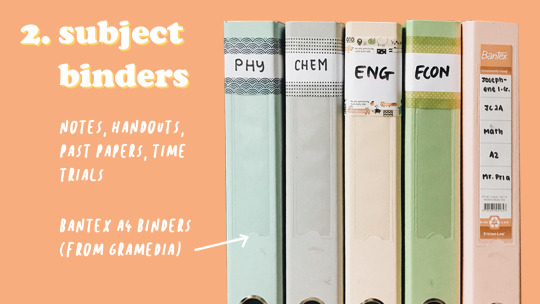
Subject Binders
At the end of the week, I’ll sort my papers into my subject binders. Sometimes I’ll keep some papers in the folder if I think I’ll be needing it the next week. This usually only applies to worksheets because all my teachers’ notes are available on Google Classroom, so I can access them even if I don’t physically have them.
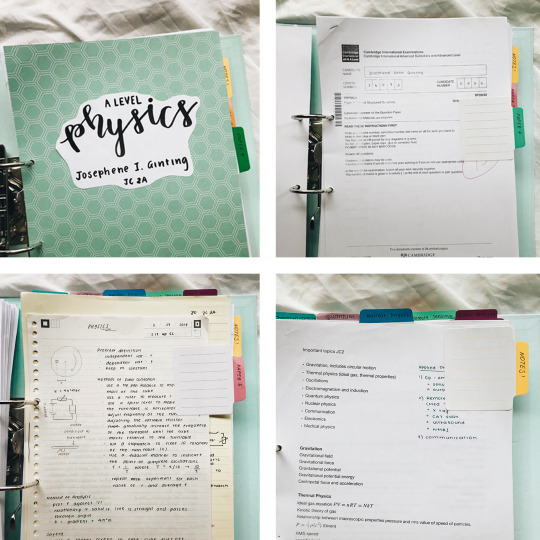
Each of these binders have sections inside them:
Physics: 1 for handouts, notes, and tests, 1 for Paper 4 (Theory), 1 for Paper 5 (Practical Planning). I included extra tabs to mark the different topics in the handouts section.
Chemistry: same as Physics.
Economics: 1 for Paper 3 (MCQ), 1 for Paper 4 (Case Study and Essay). A lot of my Economics material is online, though.
English: 1 for Paper 3 (Text and Discourse analysis), and 2 for Paper 4 (Language Topics, which includes 1 for Child Language Acquisition, 1 for World Englishes). Past papers, handouts, and notes all go under their respective topics.
Mathematics: I just keep everything together because I never revise math and just constantly do past papers.
This makes it easier for me to revise each subject because I can just take one binder with me instead of a messy folder with everything just shoved in there.

I keep a magazine file for each of my A-Level subjects (English and Mathematics are combined). All my textbooks, revision guides, and subject notebooks are kept here, so if I need to revise one subject, that’s the magazine file I’ll take out.
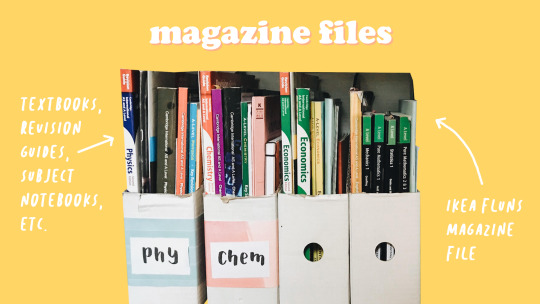
These magazine files prevent any small things (like my book of flashcards) from being shoved to the back of my bookshelf, or materials from different subjects from getting mixed up.

In my senior year, I mostly plan using this app called Edo Agenda. It syncs across all my devices for free and has all the features I need: a to do list to organize tasks, monthly and weekly calendars to organize events, a journal to organize notes and memos.
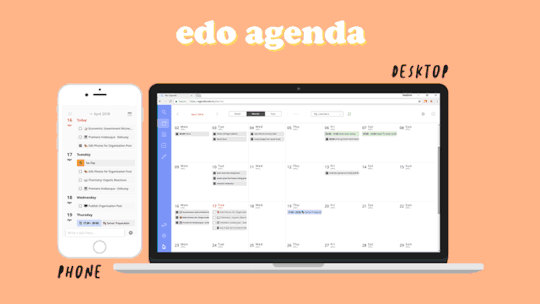
I used to bullet journal regularly, but it takes too much time during weekdays, so now I just bullet journal for the therapeutic effects it gives me, and I use an app for organizing tasks and events. Sometimes at the end of each week, I’ll transfer my tasks to my bullet journal and then decorate the page, but again, this is just for its therapy.

Organizing your school supplies is just as important as organizing your papers and notes. With a more organized backpack and pencil case, you won’t waste time looking for your things at the bottom of an abyss.
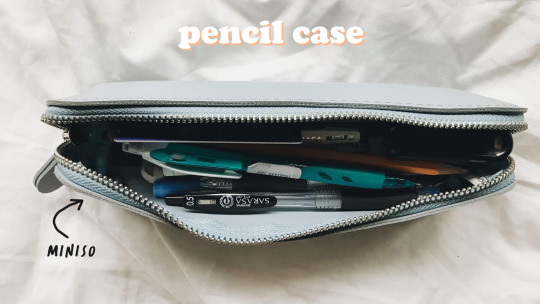
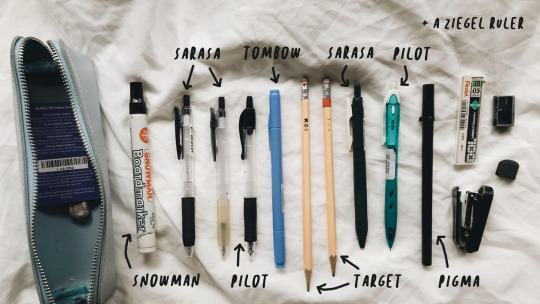
Pencil Case
I don’t find it necessary to bring so much stationery to school unless I plan on making notes at school (usually during revision week).
Backpack
Because we’re already in the revision term, I don’t really carry a lot of things in my everyday backpack, just the following:
Pencil case
Everything Notebook
Everything Folder
Revision notebook
Kindle
Phone
Wallet
Earphones
Calculator
Speaker
Drinking bottle
A pouch with things like a hairbrush, pads, and lip balm
And that’s all for now! I hope this post will help you organize your school life (if you haven’t already) or at least provide some useful insights on some ways to stay organized as a high school student.
45K notes
·
View notes
Photo


This is a summary of college only using two pictures; expensive as hell.
That’s my Sociology “book”. In fact what it is is a piece of paper with codes written on it to allow me to access an electronic version of a book. I was told by my professor that I could not buy any other paperback version, or use another code, so I was left with no option other than buying a piece of paper for over $200. Best part about all this is my professor wrote the books; there’s something hilariously sadistic about that. So I pretty much doled out $200 for a current edition of an online textbook that is no different than an older, paperback edition of the same book for $5; yeah, I checked. My mistake for listening to my professor.
This is why we download.
Alternatives to buying overpriced textbooks
Textbooknova
Reddit
Bookboon
Textbookrevolution
GaTech Math Textbooks
Ebookee
Freebookspot
Free-ebooks
Getfreeebooks
BookFinder
Oerconsortium
Project Gutenberg
1M notes
·
View notes
Text
When to use flash cards: memorizing words/vocab, numbers, equations, names, dates, and verbatim facts or lines.
When to use mnemonic devices: memorizing steps of a process or sets of facts/information/people, especially in an order.
When to use concept maps or drawings: learning (rather than memorizing) relationships, processes, concepts, systems, etc.
When to use tables or charts: learning or memorizing systems (eg. conjugation in a foreign language), sets of sets of information (eg. people and when they lived and what they did), and other large/complex groups of information.
When to use songs: for learning or memorizing anything.
Disclaimer: this is a general guideline. If something else works for you, do it!
42K notes
·
View notes